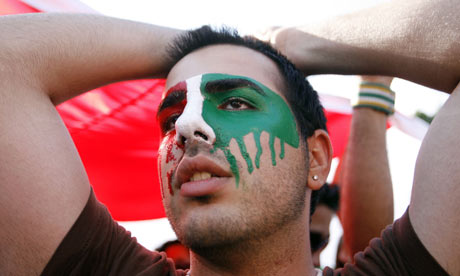
China accuses US of online warfare in Iran
Tania Branigan in Beijing and agencies
The United States used "online warfare" to stir up unrest in Iran after last year's elections, the Chinese Communist party newspaper claimed today, hitting back at Hillary Clinton's speech last week about internet freedom.
An editorial in the People's Daily accused the US of launching a "hacker brigade" and said it had used social media such as Twitter to spread rumours and create trouble.
 A protest over the Iranian election in Washington last June. Photograph: Molly Riley/Reuter
A protest over the Iranian election in Washington last June. Photograph: Molly Riley/Reuter
"Behind what America calls free speech is naked political scheming. How did the unrest after the Iranian election come about?" said the editorial, signed by Wang Xiaoyang. "It was because online warfare launched by America, via YouTube video and Twitter microblogging, spread rumours, created splits, stirred up and sowed discord between the followers of conservative reformist factions."
Washington said at the time of the unrest that it had asked Twitter, which was embraced by Iranian anti-government protesters, to remain open. Several social media sites, including YouTube, Facebook and Twitter, have been blocked in China in the last year.
The editorial asked rhetorically whether obscenity or activities promoting terrorism would be allowed on the net in the US. "We're afraid that in the eyes of American politicians, only information controlled by America is free information, only news acknowledged by America is free news, only speech approved by America is free speech, and only information flow that suits American interests is free information flow," it added.
It attacked the decision to cut off of Microsoft's instant messaging services to nations covered by US sanctions, including Cuba, Iran, Syria, Sudan and North Korea, as violating America's stated desire for free information flow. Washington later said that such services fostered democracy and encouraged their restoration.
China initially gave a low-key response to Google's announcement that it was no longer willing to censor google.cn. The internet giant said it had reached its decision following a Chinese-originated cyber attack targeting the email accounts of human rights activists, and in light of increasing online censorship.
Clinton's direct challenge to China, in a speech that had echoes of the cold war with its references to the Berlin wall and an "information curtain", led Beijing to warn that US criticism could damage bilateral relations. Clinton called on China to hold a full and open investigation into the December attack on Google.
In an interview carried by several Chinese newspapers today, Zhou Yonglin, deputy operations director of the national computer network emergency response technical team, said: "Everyone with technical knowledge of computers knows that just because a hacker used an IP address in China, the attack was not necessarily launched by a Chinese hacker."
US diplomats sought to reach out to the Chinese public by briefing bloggers in China on Friday. They held a similar meeting during Barack Obama's visit in November.
www.guardian.co.uk/world/2010/jan/24/china-us-iran-online-warfare
Jan. 24, 2010
